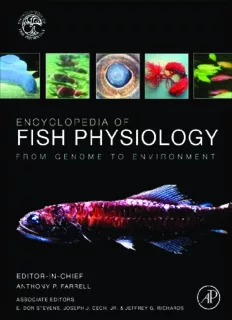
Encyclopedia of Fish Physiology: From Genome to Environment PDF
Preview Encyclopedia of Fish Physiology: From Genome to Environment
E NCYCLOPEDIA OF FISH PHYSIOLOGY: FROM GENOME TO ENVIRONMENT How to go to your page This eBook set contains 3 volumes. Each volume has its own page numbering scheme for the front matter. For example, to go to Volume 1, page ii, type ’Vol1:ii’ in the “page #” box at the top of the screen and click “Go”. To go to Volume 2, page v, type ’Vol2:v’ in the “page #” box at the top of the screen and click “Go”. The chapter numbers are continuous between the all three volumes. Please refer to the eTOC for any further clarification. E NCYCLOPEDIA OF FISH PHYSIOLOGY: FROM GENOME TO ENVIRONMENT Volume 1 THE SENSES, SUPPORTING TISSUES, REPRODUCTION, AND BEHAVIOR Editor-in-Chief ANTHONY P. FARRELL Department ofZoology, Universityof BritishColumbia, Vancouver, BC, Canada AMSTERDAM BOSTON HEIDELBERG LONDON NEWYORK OXFORD PARIS SAN DIEGO SAN FRANCISCO SINGAPORE SYDNEY TOKYO AcademicPress is animprint of Elsevier AcademicPressisanimprintofElsevier 32JamestownRoad,LondonNWI7BY,UK 225WymanStreet,Waltham,MA02451,USA 525BStreet,Suite1900,SanDiego,CA92101-4495,USA Copyright(cid:2)2011ElsevierInc.Allrightsreserved ThefollowingarticlesareUSgovernmentworksinthepublicdomainandarenotsubjecttocopyright: EnergeticModels:BioenergeticsinEcosystems HormonalControlofMetabolismandIonicRegulation:TheHormonalControlofOsmoregulationinTeleostFish SwimmingandOtherActivities:AppliedAspectsofFishSwimmingPerformance TheSkin:FunctionalMorphologyoftheIntegumentarySysteminFishes;TheManyFunctionsofFishIntegument ThefollowingarticlesareCrownCopyright: FishMigrations:EelMigrations SocialandReproductiveBehaviors:SexualBehaviorinFish Nopartofthispublicationmaybereproduced,storedinaretrievalsystem ortransmittedinanyformorbyanymeanselectronic,mechanical,photocopying, recordingorotherwisewithoutthepriorwrittenpermissionofthepublisher PermissionsmaybesoughtdirectlyfromElsevier’sScience&TechnologyRightsDepartmentinOxford, UK:phone(+44)(0)1865843830;fax(+44)(0)1865853333;email:[email protected]. AlternativelyyoucansubmityourrequestonlinebyvisitingtheElsevier websiteat(http://elsevier.com/locate/permissions),andselecting ObtainingpermissiontouseElseviermaterial Notice Noresponsibilityisassumedbythepublisherforanyinjuryand/ordamagetopersonsorpropertyasa matterofproductsliability,negligenceorotherwise,orfromanyuseoroperationofanymethods, products,instructionsorideascontainedinthematerialherein,Becauseofrapidadvancesinthe medicalsciences,inparticular,independentverificationofdiagnosesanddrugdosagesshouldbemade BritishLibraryCataloguinginPublicationData AcataloguerecordforthisbookisavailablefromtheBritishLibrary LibraryofCongressCatalogNumber:2011923567 ISBN:978-0-12-374545-3 ForinformationonallElsevierpublications visitourwebsiteatbooks.elsevier.com PrintedandboundinItaly 111213141510987654321 Forsupplementarymaterialpleasevisitthecompanionsite: http://www.elsevierdirect.com/companions/9780123745453 Working together to grow libraries in developing countries www.elsevier.com | www.bookaid.org | www.sabre.org Editorial:KateMittell Production:NickyCarter EDITORS EDITOR-IN-CHIEF APFarrell DepartmentofZoology,UniversityofBritishColumbia,Vancouver,BC,Canada ASSOCIATEEDITORS JJCech,Jr. DepartmentofWildlife,Fish,andConservationBiology,UniversityofCalifornia,Davis,CA,USA JGRichards DepartmentofZoology,UniversityofBritishColumbia,Vancouver,BC,Canada EDStevens DepartmentofBiomedicalSciences,AtlanticVeterinaryCollege,UniversityofPrinceEdwardIsland, Charlottetown,PE,Canada Thispageintentionallyleftblank EDITORS’ BIOGRAPHIES Editor-in-Chief Anthony P. Farrell, Department of Zoology, University of British Columbia, Vancouver,BC,Canada TonyFarrellisagraduateofBathUniversity,wherehewasfortunatetostudywithPeter Lutz. His fortunes grew further when he moved in 1974 to Canada and the Zoology Department at the University of British Columbia (UBC) to complete his PhD degree undertheexcellenttutelageofDaveRandall.In2004,TonyreturnedtoUBCwhenhe accepted an endowed research chair in sustainable aquaculture. In between these posi- tionsatUBC,Tonywasemployedat the University ofSouthernCalifornia(PDF),the University of New Brunswick (sessional lecturer), Mount Allison University (first real job), and Simon Fraser University (moving through the ranks to a full professor). In addition to highly controlled laboratory experiments on fish cardiorespiratory physiol- ogy,Tonyiscommittedtoworkingonanimalsintheirownenvironment.Therefore,hisresearchonfishphysiology hastakenhimonanAlphaHelixexpeditiontotheAmazon,theUniversityofGothenburgandtheKristinebergMarine Research Station in Sweden, the Portobello Marine Biological Station in New Zealand, the University of Christchurch and Massey University in New Zealand, the Bamfield Marine Science Station and the Huntsman Marine Station in Canada, the University of Aarhus in Denmark, the University of Adelaide Charles and Darwin University in Australia, and to the Danish Arctic Marine Station on Disco Island in Greenland. These travels have allowedhimtoworkwithmanysuperbcollaboratorswordwide,aswellasstudythephysiologyofover70different species of fish. Tony has received a number of awards for his scientific contributions: an honorary degree from the UniversityofGothenburginSweden;AwardsofExcellencefromtheAmericanFisheriesSocietyforFishPhysiology, Conservation and Management; the Fry Medal from the Canadian Society of Zoologists; and the Beverton Medal fromtheFisheriesSocietyoftheBritishIsles. AssociateEditor Joseph J. Cech, Jr., Department of Wildlife, Fish, and Conservation Biology, UniversityofCalifornia,Davis,CA,USA JoeCechgrewupinnorthernIllinois<1kmfromtheSaltCreekPreserve,wherehespent many hours as a boy. Summer trips to northern Wisconsin, northern Minnesota, and southern Ontario increased hisinterest inaquatic habitats and their fishes. He graduated from the University of Wisconsin (UW, Madison), where he was fortunate to study oceanography under Robert Ragotzkie and fish biology under Art Hasler and Fran Henderson in the UW Laboratory of Limnology. Before completing his BS degree in zoology,hewasfortunatetoserveastheresidentzoologistaboardtheR/VDanteDeo,fora year,asitcrossedtheCaribbeanSeaandtheSouthPacificOcean.Completinghisdegree upon his return, he was hired as a research assistant at the University of Texas’ Marine Science Institute (UTMSI), where he earned his MA and PhD degrees in zoology, under the supervision of Curly Wohschlag.DuringhisgraduateeducationinAustin(Texas),hestudiedfishbiologyunderClarkHubbsandphysiology underJackMyersandJimLarimer.Aftera2-yearpostdoctoralpositioninMaine,hewashiredasafishphysiological ecologist faculty member at the University of California (UC), Davis, in the Department of Wildlife, Fish, and ConservationBiology. Duringhis32yearsasanactivefacultymemberatUCDavis,hisresearch onthephysiologicalecologyoffishes tookhimtoCanada(UniversityofBritishColumbia,BamfieldMarineStation),Finland(UniversityofHelsinki),and to other laboratories in the USA (University of Tennessee, Scripps Institution of Oceanography, R/V David Starr Jordan in the North Pacific Ocean, UTMSI, Oregon Institute of Marine Biology, and the UC Bodega Marine Laboratory)wherehecollaboratedwithmanyexcellentscientists.Duringthisperiod,hetaughtcoursesinphysiology of fishes, physiological ecology, and field studies in fish biology; he supervised 25 graduate students (10 MS and vii viii Editors’Biographies 15PhD)inthedisciplinaryareasofecology,physiology,zoology,andpharmacology/toxicologyatUCDavis.Heisa fellow of the AIFRB and AAAS, and he received Awards of Excellence from the American Fisheries Society (Physiology Section, and California-Nevada Chapter) and the UC Davis Prize for Undergraduate Teaching and ScholarlyAchievement.Finally,heco-authoredapopularichthyologytextbook,withPeterMoyle,andhepublished morethan160peer-reviewedpublicationsonthephysiologicalecologyoffishes.HeiscurrentlyProfessorEmeritus ofFishBiologyattheUniversityofCaliforniaDavis. AssociateEditor Jeffrey G. Richards, Department of Zoology, University of British Columbia, Vancouver,BC,Canada JeffreyRichardsisanassociateprofessorintheDepartmentofZoologyattheUniversity ofBritishColumbia,Canada.HestartedhisacademiccareerintheDepartmentofBiology atWilfridLaurierUniversityobtainingaBScin1995.HethenwentontodoanMScat theUniversityofWaterlooundertheguidanceofthelateProf.RichardPlayle.WithProf. Playle,hestudiedenvironmentalphysiologyandtoxicologyinfish.FollowinghisMSc,he entered the laboratory of Prof. Chris Wood at McMaster University and focused his research on energy metabolism in swimming fish. He completed his PhD in 2002 and tookupapostdoctoralfellowshipattheUniversityofBritishColumbiawithProf.Patricia Schulte.Aftera2-yearpostdoctoralwork,hestartedattheUniversityofBritishColumbia as an assistant professor in 2004. His lab studies the relationship between plasticity and adaptive variation in the mechanisms that initiate, maintain, and coordinate metabolic energy balance in animals during exposure to environ- mentalstress.Heisparticularlyinterestedintheadaptationstolowoxygen(hypoxia)infishandotherlowervertebrates. He prefers, whenever possible, to study animals in their natural habitat; thus, he travels extensively to unique and challengingenvironments,includingtheAmazonandtheTibetanplateau. AssociateEditor E. Don Stevens, Department of Biomedical Sciences, Atlantic Veterinary College, UniversityofPrinceEdwardIsland,Charlottetown,PE,Canada Don Stevens did an MSc with the late Edgar Black on the effects of severe exercise on metabolitesintroutinthePhysiologyDepartmentatUBCafteranundergraduatedegree inmathematicsandzoologyattheUniversityofVictoria.Hethenmovedacrossthestreet to do a PhD on effects of moderate exercise on respiration and circulation in trout with DaveRandall,whojusthadbeenhiredintheZoologyDepartmentatUBC(summarizedin aJEBclassicsarticle,JournalofExperimentalBiology211:1521).Hisfirstpositionwasatthe ZoologyDepartmentattheUniversityofHawaiiwherehediscoveredthattherewasmore to the fish world than trout, and that there was no such thing as the physiology of fish, rathertherewasaphysiologyoffishes.InHawaii,heworkedmostlyonthebiologyoftropicaltunaswithafocusontheir warm-bodiedness,inparticularhowtheyachievedhigherthanambientbodytemperaturesandtheadaptiveadvantage ofthem.HethenjoinedtheZoologyDepartmentattheUniversityofGuelphworkinginthegeneralareaofcomparative physiology with a focus on exercise effects until he retired in 2004. He now has an adjunct position at the Atlantic VeterinaryCollegeandcontinuestodoresearchinfishphysiology. SECTION EDITORS CBrauner KROlson DepartmentofZoology,UniversityofBritishColumbia, DepartmentofBiologicalSciences,UniversityofNotre Vancouver,BC,Canada Dame,NotreDame,IN,USA ABButler COlsson DepartmentMolecularNeuroscience,GeorgeMason Zoophysiology,UniversityofGoteberg,Goteberg, University,Fairfax,VA,USA Sweden BACarlson ANPopper DepartmentofBiology,WashingtonUniversity,St.Louis, DepartmentofBiology,UniversityofMaryland,College MO,USA Park,MD,USA BMCasper JGRichards DepartmentofBiology,UniversityofMaryland,College DepartmentofZoology,UniversityofBritishColumbia, Park,MD,USA Vancouver,BC,Canada JJCech,Jr. PMSchulte DepartmentofWildlife,Fish,andConservationBiology, DepartmentofZoology,UniversityofBritishColumbia, UniversityofCalifornia,Davis,CA,USA Vancouver,BC,Canada APFarrell DepartmentofZoology,UniversityofBritishColumbia, REShadwick Vancouver,BC,Canada DepartmentofZoology,UniversityofBritishColumbia, Vancouver,BC,Canada GGoss BiologicalSciences,UniversityofAlberta,Edmonton,AB, KSloman Canada University of the West of Scotland, Paisley, Scotland, UK JBGraham DepartmentofEconomics,UniversityofCaliforniaatSan EDStevens Diego,LaJolla,CA,USA DepartmentofBiomedicalSciences,AtlanticVeterinary College,UniversityofPrinceEdwardIsland, TJHara Charlottetown,PE,Canada UniversityofManitoba,Winnipeg,MB,Canada SHolmgren APSummers Zoophysiology,UniversityofGoteberg,Goteberg,Sweden FridayHarborLaboratories,UniversityofWashington, FridayHarbor,WA,USA NMaclean BiologicalSciences,UniversityofSouthampton, MVijayan Hampshire,UK DepartmentofBiology,UniversityofWaterloo,Waterloo, ON,Canada JANelson DepartmentofBiologicalSciences,TowsonUniversity, H-JWagner Towson,MD,USA UniversitaetTuebingen,Tuebingen,Germany
Description: